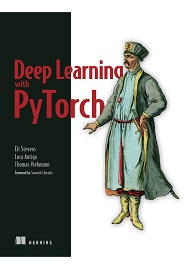
English | 2020 | ISBN: 978-1617295263 | 520 Pages | PDF, EPUB | 258 MB
Every other day we hear about new ways to put deep learning to good use: improved medical imaging, accurate credit card fraud detection, long range weather forecasting, and more. PyTorch puts these superpowers in your hands, providing a comfortable Python experience that gets you started quickly and then grows with you as you—and your deep learning skills—become more sophisticated. Deep Learning with PyTorch will make that journey engaging and fun.
about the technology
Although many deep learning tools use Python, the PyTorch library is truly Pythonic. Instantly familiar to anyone who knows PyData tools like NumPy and scikit-learn, PyTorch simplifies deep learning without sacrificing advanced features. It’s excellent for building quick models, and it scales smoothly from laptop to enterprise. Because companies like Apple, Facebook, and JPMorgan Chase rely on PyTorch, it’s a great skill to have as you expand your career options. It’s easy to get started with PyTorch. It minimizes cognitive overhead without sacrificing the access to advanced features, meaning you can focus on what matters the most – building and training the latest and greatest deep learning models and contribute to making a dent in the world. PyTorch is also a snap to scale and extend, and it partners well with other Python tooling. PyTorch has been adopted by hundreds of deep learning practitioners and several first-class players like FAIR, OpenAI, FastAI and Purdue.
about the book
Deep Learning with PyTorch teaches you to create neural networks and deep learning systems with PyTorch. This practical book quickly gets you to work building a real-world example from scratch: a tumor image classifier. Along the way, it covers best practices for the entire DL pipeline, including the PyTorch Tensor API, loading data in Python, monitoring training, and visualizing results. After covering the basics, the book will take you on a journey through larger projects. The centerpiece of the book is a neural network designed for cancer detection. You’ll discover ways for training networks with limited inputs and start processing data to get some results. You’ll sift through the unreliable initial results and focus on how to diagnose and fix the problems in your neural network. Finally, you’ll look at ways to improve your results by training with augmented data, make improvements to the model architecture, and perform other fine tuning.
What’s inside
- Training deep neural networks
- Implementing modules and loss functions
- Utilizing pretrained models from PyTorch Hub
- Exploring code samples in Jupyter Notebooks
Resolve the captcha to access the links!